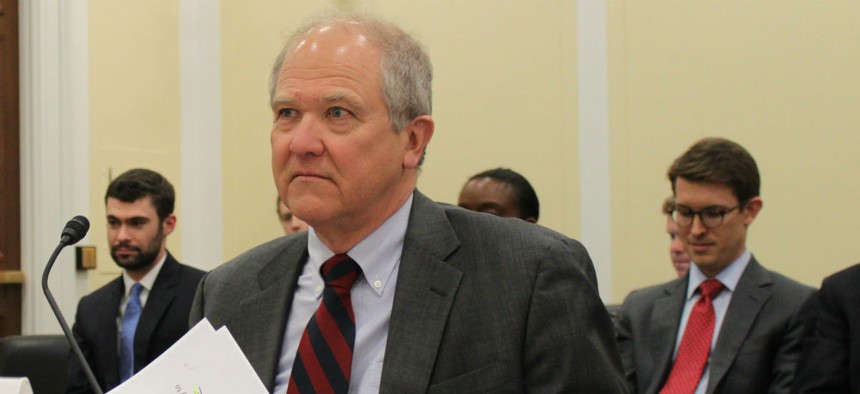
SIGAR John Sopko is seeking details on construction of a $43 million single compressed natural gas station with disappointing results . Special Inspector General for Afghanistan Reconstruction
U.S. Efforts to Shore Up Afghan Economy Foundering, Watchdog Finds
$43 million gas pipeline and minerals extraction project not currently sustainable.
The Defense Department’s business stability task force operating in war-torn Afghanistan has overlooked obstacles to a plan for a natural gas-powered automobile industry as well as commercial exploitation of the country’s vast underground wealth of minerals, an inspector general found.
In a letter to Defense Secretary Ash Carter released Friday, John Sopko, special inspector general for Afghanistan reconstruction, sought details on construction of a $43 million single compressed natural gas station with disappointing results for the troubled country’s quest for economic growth. The IG said problems with the project, as summarized by Vestige Consulting LLC, and aimed at Afghanistan’s second largest city, Mazar-e-Sharif, include:
- The scant ability to transport compressed gas to Mazar-e-Sharif, which “limits the practicality of expanding the CNG industry in that city. (DoD personnel say there is only one natural gas pipeline providing gas to Mazar-e-Sharif, and it is safe to operate only at “minimal” pressure.);
- Construction on a planned new pipeline has not started while some $6.5 million worth of new pipe is apparently sitting in storage;
- The project may never be completed unless the state-owned Afghan Gas Enterprise pays up to $16 million for its completion; and,
- The process for converting automobiles in Afghanistan to use compressed natural gas “appears to be cost-prohibitive for all but the wealthiest of Afghans,” SIGAR wrote, adding that the annual per capita Gross National Income for Afghanistan is $690.2, while it costs up to $800 to convert an automobile to natural gas in that country.
“While I understand that [the DoD business task force’s] $43 million Downstream Gas Utilization project resulted in the successful construction and licensing of a single CNG station, I am concerned that it accomplished little else,” Sopko wrote.
His letter ended with a series of requests for information such as whether a feasibility study was performed before the one station was built, why the location was picked, who owns the station and how much revenue it provides to the Afghan government.
The same DoD task force was faulted in late April when SIGAR released an audit of $488 million in U.S. assistance to Afghanistan's mining, oil and gas industry, being delivered jointly with the State Department and the U.S. Agency for International Development.
Untapped mineral deposits for years have been at the heart of U.S. hopes for an eventually self-sustaining Afghan economy. But SIGAR auditors concluded that the three agencies failed to coordinate and prioritize their extractives activities even among themselves, resulting in divergent strategies and poor working relationships, and creating potential sustainability problems.
“One senior official from the U.S. Embassy in Kabul stated that the embassy did not become aware of a $39.6 million [task force] project until Afghan government officials thanked the ambassador for U.S. support,” a SIGAR summary said. "Officials from USAID, State, and [the DoD business task force] all agreed that coordination efforts had all but fallen apart by December 2014.”
Because no U.S. agency remaining in the war-ravaged country has plans to monitor or support efforts to extract minerals, there is a risk that the data, equipment and human capital invested “will be squandered,” the audit said. A failure to generate new home-grown revenue would extend Afghanistan’s dependency on international assistance.
SIGAR recommended that USAID report to Congress why it hadn’t taken over some of the DoD task force’s activities and update its performance management plan. USAID in a letter disagreed with the first recommendation, saying such reporting to Congress had taken place and that it could not take on new projects without new funds. USAID agreed with the other recommendation.
Correction: The original story said Vestige executed the project, but in fact Vestige reported on the project, which was executed by the Pentagon's Task Force for Business and Stability Operations.







